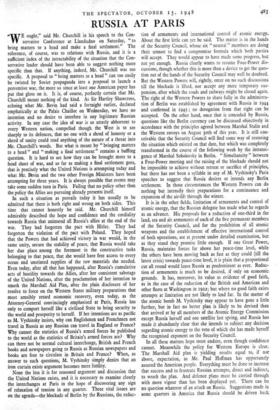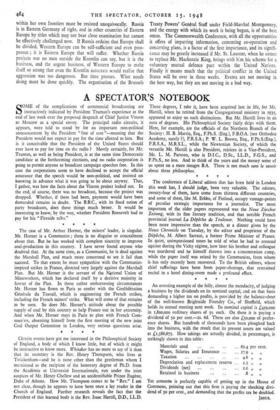RUSSIA AT PARIS
4WE ought," said Mr. Churchill in his speech to the Con- servative Conference at Llandudno on Saturday, " to bring matters to a head and make a final settlement." The reference, of course, was to relations with Russia, and it is a sufficient index of the intractability of the situation that the Con- servative leader should have been able to suggest nothing more specific than that. If anything, indeed, Mr. Churchill was too specific. A proposal to " bring matters to a head " can too easily be twisted by Soviet propaganda into a proposal to launch a preventive war, the more so since at least one American paper has put that gloss on it. It is, of course, perfectly certain that Mr. Churchill meant nothing of the kind. As Sir Hartley Shawcross, echoing what Mr. Bevin had said a fortnight earlier, declared emphatically at the Palais Chaillot on Wednesday, we have no intention and no desire to interfere in any legitimate Russian activity. In any case the idea of war is so utterly abhorrent to every Western nation, compelled though the West is to see sharply to its defences, that no one with a shred of honesty or a shred of sanity could read anything of the nature of a threat into Mr. Churchill's words. But what is meant by " bringing matters to a head " and " making a final settlement " remains a baffling question. It is hard to see how they can be brought more to a head short of war, and so far as making a final settlement goes, that is precisely what the United Nations is attempting today and what Mr. Bevin and the two other Foreign Ministers have been attempting for three years. It is always possible that events may take some sudden turn in Paris. Failing that no policy other than the policy the Allies are pursuing already presents itself.
In such a situation as prevails today it has usually to be admitted that there is both right and wrong on both sides. This time that cannot honestly be said. Mr. Churchill himself admirably described the hope and confidence and the cordiality towards Russia that animated all Russia's allies at the end of the war. They had forgotten the pact with Hitler. They had forgotten the violation of the pact with Poland. They hoped that the Powers that had achieved victory in war would, in the same unity, secure the stability of peace, that Russia would take her due place among the foremost in the constructive tasks belonging to that peace, that she would have free access to every ocean and unstinted supplies of the raw materials she needed. Even today, after all that has happened, after Russia's cumulative acts of hostility towards the Allies, after her consistent sabotage of the United Nations, after the proclamation of her intention to smash the Marshall Aid Plan, after the plain disclosure of her resolve to force on the Western States military preparations that must sensibly retard economic recovery, even today, as the Attorney-General convincingly emphasised at Paris, Russia has only to comport herself like a civilised State to bring security to the world and prosperity to herself. If her intentions are as pacific as M. Vyshinsky insists, why can Englishmen and Frenchmen not travel in Russia as any Russian can travel in England or France? Why cannot the statistics of Russia's armed forces be published to the world as the statistics of Britain's armed forces are? Why can there not be normal cultural interchange, British and French books and newspapers going to Russia as Russian newspapers and books are free to circulate in Britain and France? When, as answer to such questions, M. Vyshinsky simply denies that an iron curtain exists argument becomes mere futility.
None the less it is for reasoned argument and discussion that the United Nations exists, and it is necessary to examine closely the interchanges at Paris in the hope of discovering any sign of relaxation of tension in any quarter. Three vital issues are on the agenda—the blockade of Berlin by the Russians, the reduc- tion of armaments and international control of atomic energy.. About the first little can yet be said. The matter is in the hands of the Security Council, whose six " neutral " members are doing their utmost to find a compromise formula which both parties will accept. They would appear to have made some progress, but not yet enough. Russia clearly wants to resume Four-Power dis- cussions, though whether this is more than a device to get the ques- tion out of the hands of the Security Council may well be doubted.
But the Western Powers will, rightly, enter on no such discussions till the blockade is lifted, nor accept any mere temporary sus- pension, after which the roads and railways might be closed again.
The right of the Western Powers to share fully in the administra- tion of Berlin was established by agreement with Russia in 1944 and confirmed in 1945 ; no derogation from that right can be accepted. On the other hand, once that is conceded by Russia, questions like the Berlin currency can be discussed objectively in accordance with the principles agreed between Marshal Stalin and the Western envoys on August 3oth of this year. It is still con- ceivable that the Security Council will find some way of restoring the situation which existed on that date, but which was completely transformed in the course of the following week by the intransi- gence of Marshal Sokolovsky in Berlin. " Simultaneity " between a Four-Power meeting and the raising of the blockade should not be impossible to achieve without retreat or sacrifice of principles, but there has not been a syllable in any of M. Vyshinsky's Paris speeches to suggest that Russia desires or intends any Berlin settlement. In those circumstances the Western Powers can do nothing but intensify their preparations for a continuance and expansion of the air-lift through the winter.
It is in the other fields, limitation of armaments and control of atomic energy, that the Russian delegate has made what he regards as an advance. His proposals for a reduction of one-third in the land, sea and air armaments of each of the five permanent members of the Security Council, and for the prohibition of all atomic weapons and the establishment of effective international control of both operations, are at present under detailed examination, but as they stand they promise little enough. If one Great Power, Russia, maintains forces far above her peace-time level, while the others have been moving back as fast as they could (till the latest crisis) towards peace-time level, it is plain that a proportional cut all round would leave Russia as predominant as ever. Reduc- tion of armaments is much to be desired, if only on economic grounds. It has, moreover, its value as evidence of good faith, as in the case of the reduction of the British and American and other fleets at Washington in 1922; but where no good faith exists attempts at limitation are not likely to lead far. In the matter of the atomic bomb M. Vyshinsky may appear to have gone a little further, but in fact no better plan is likely to be devised than that arrived at by all members of the Atomic Energy Commission except Russia herself and one satellite last spring, and Russia has made it abundantly clear that she intends to subject any decision regarding atomic energy to the veto of which she has made herself the recognised exponent on the Security Council.
In all these matters hope must endure, even though confidence cannot. Meanwhile the policy for Western Europe is clear. The Marshall Aid plan is yielding results equal to, if not above, expectation, as Mr. Paul Hoffman has opportunely assured the American people. Everything must be done to increase that success and to frustrate Russian attempts, direct and indirect, to wreck the plan. And defence plans must be carried through with more vigour than has been displayed yet. There can be no question whatever of an attack on Russia. Suggestions made in some quarters in America that Russia should be driven back within her own frontiers must be resisted unequivocally. Russia is in Eastern Germany of right, and in other countries of Eastern Europe by titles which may not bear close examination but cannot be effectively challenged now. If Russia ordains that Europe shall be divided, Western Europe can be self-sufficient and even pros- perous ; it is Eastern Europe that will suffer. Whether Russia projects war no man outside the Kremlin can say, but it is the business, and the urgent business, of Western Europe to make itself so strong that even the Kremlin autocrats would realise that aggression was too dangerous. But time presses. What needs doing must be done quickly. The organisation of the Brussels Treaty Powers' General Staff under Field-Marshal Montgomery, and the energy with which its work is being begun, is of the best omen. The Commonwealth Conference, with all the opportunities it offers of imparting information, cementing co-operation and concerting plans, is a factor of the first importance, and its signifi- cance may be greatly increased if Mr. St. Laurent, when he comes to replace Mr. Mackenzie King, brings with him,his scheme for a voluntary mutual defence pact within the United Nations. Finally it means much that the political conflict in the United States will be over in three weeks. Events are not moving in the best way, but they are not moving in a bad way.



































 Previous page
Previous page